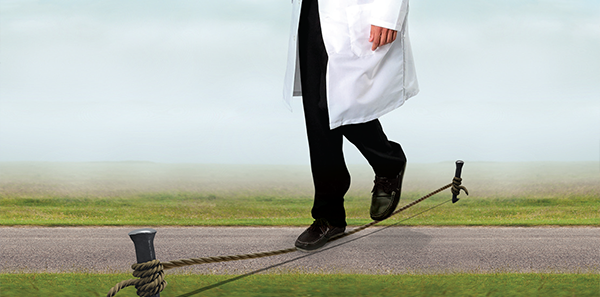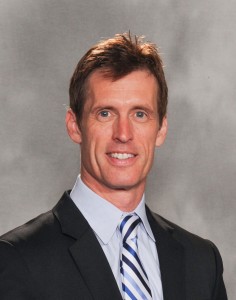
I recently attended ACEP’s Diversity Summit, spearheaded by ACEP President-Elect Rebecca Parker, MD, FACEP, as part of the diversity initiative that will be a key part of her presidency. Professionally, thank you Dr. Parker for your vision and leadership, and personally, I thank you for your invitation to the Diversity Summit. I learned a few things about myself, and more importantly, I learned about others.
Explore This Issue
ACEP Now: Vol 35 – No 06 – June 2016In one of the early activities for attendees at the summit, we were asked to tell the others in our small group of three why we believed we were invited to attend. It was clear to me why others were present, as they were representing diverse groups of the College, but why me? I noted that I suspect Dr. Parker asked me because she knows I am sensitive to the issues of cultural diversity and have always tried to express my open support. However, one of my group members said, that’s not why you are here—you are here because hearing the message from someone who doesn’t need to tell it is powerful. In other words, no one is surprised to hear a woman advocate for gender equality or an African-American speak to the need for racial equality, but when the issue becomes important to those who are not directly in the line of fire and there’s a realization that we are all negatively impacted by bias and insensitivity, it becomes everyone’s issue.
We will never all be alike and nor would we want to be. There are many characteristics that make us diverse. Unfortunately, society tends to focus on obvious and easily detectable differences (eg, gender, ethnicity, religion, and sexual orientation). We may never know the countless ways each of us differs from the next. Those differences may be a source of intrigue, but not admonishment or judgment.
It’s good to be confident and comfortable in one’s own skin, but being comfortable in your skin shouldn’t imply that your skin is the standard one size that should fit all. Quite the contrary, if we enjoy being who we are, free from bias and persecution, we should ensure others enjoy that same basic human right.
I’m a Caucasian, middle-aged, Christian, heterosexual male. I’m not what people think of when they hear the word “diverse.” The summit taught me a thing or two about myself. Yes, if we focus on gender, race, etc., my demographic lacks diversity. However, when we consider the entire person, the diversity among all of us is exponential. In one summit exercise, random characteristics were called out by the facilitator and those with that characteristic were to briefly stand. “Were you a cheerleader?” Two women and one man stood. I was standing. You have no idea how uncomfortable and embarrassed I felt (or maybe you do). I felt the immediate impulse to explain why I chose that path in college (I’ll save that story for another day). But I shouldn’t have to explain this to anyone. Nonetheless, I felt the social pressure to explain why I was different. Epiphany: If I felt self-conscious about my insignificant differences being exposed for one minute, then what must others feel about their ethnicity, religion, gender, etc. when made to feel the same way? Regardless of what the characteristic was, each of us was eventually called out and publicly isolated. This was an uncommon situation for someone of my demographic background.
Due to my background, I speak from a position of relative safety. That safety can create complacency with respect to our pursuit of equality and cultural sensitivity.
People who think diversity and cultural sensitivity is a special interest may think so because they are somewhat removed from the impact it may have on others’ daily lives.
Is there oppression? It seems like a harsh term, but yes. I have heard too many stories of those changing their behavior to conform or shield themselves from scrutiny. In my opinion, that is oppression.
Shift in Perception
Wow, my eyes are wide open. My culturally diverse friends have become conditioned to accept what others may assume no longer takes place. When you conform or cloak/disguise yourself to hide from social bias and criticism, you must lose a big piece of who you are. Further, once you have decided to acquiesce, those on the outside hear nothing and see normalcy, but distance and resentment may grow on the inside. Silence harbors further division.
Cultural sensitivity is not a cliché, it’s not a special interest and it’s not something that “those people talk about.” Ignorance is no longer an excuse and silence is no longer acceptable. We collectively own this issue.
If I were homosexual, African-American, Hispanic, or in any other minority group, I believe I wouId feel angry if I were treated differently because of what I am and not who I am.
It’s unconscionable to cast a disparaging look or make a negative comment about persons with disabilities. So, please help me understand why other non-choices in life easily lead to judgment from others. I did not choose to be a male, Caucasian, or heterosexual. I just am. It‘s not subject to debate, nor a basis for challenge, because I also just happen not to be something else. This is what I am, but not entirely who I am.
We Can Do Better
Trying to really consider how others may feel, I would suggest that when it comes to cultural sensitivity, let’s not be “color blind.” This concept has always bothered me. Being blind to someone’s skin color doesn’t demonstrate compassion and acceptance; rather it condones ignoring a very important aspect of who that person is. Acceptance is all-inclusive and not a selective process.
My perspective of another is not impacted by their sexual orientation, and they certainly shouldn’t feel social pressure to publicly declare their sexuality, as if this information is a secret kept from society. Hiding or suppressing one’s identity due to societal pressure doesn’t make them more like everyone else. One attendee at the summit noted that heterosexuals do not have to declare their sexuality to others. Why then is there social pressure for homosexuals to disclose such intimate details?
Ask yourself this question: “Have I ever been surprised by someone‘s race, ethnicity, faith, or sexual orientation?”
If the answer is yes, and I suspect we all wouId answer yes, this should expose the fact that we probably all have some internal biases. It’s not wrong; it’s reality. What we do with those biases, a choice, is the standard by which we should all be judged. Recognizing our own internal biases allows us to build the necessary barriers between the subconscious and the conscious so that those biases, whatever their origin, do not define our actions, and ultimately, how we treat others. I believe this is a part of personal growth, and we owe this to each other, our patients, and ourselves.
Ignorance is no longer an excuse and silence is no longer acceptable. We collectively own this issue.
I know life and society are too complex to expect everyone to just get along. In fact, you can dislike as many and whomever you choose, but I challenge you to make certain you have a justifiable and rational reason for doing so.
I‘m not a social activist. I‘m a sensitive realist. How can I accept inequality for others and remain silent if I wouId not tolerate inequality and insensitivity toward my family or me?
Recognizing our tendency toward bias is the first step. Make a conscious decision to control those biases and not let them define you. There are many faces of emergency medicine, embracing our diversity makes us all stronger, while closing our minds limits our personal and collective growth as a specialty.
Pages: 1 2 3 4 | Multi-Page





One Response to “ACEP Diversity Summit Promotes Cultural Sensitivity, Acceptance Among Members”
June 22, 2016
Mark Rabold, MDI just finished 30 years as an ER Doc and have always said “Thank God that the ER is the last bastion against the lunacy and stupidity of political correctness”. I was deeply saddened to see that this is no longer true. We used to be the no BS specialty and just did what needed to be done without bowing to political whims. It is sad that Dr. Klauer is now a true believer and thinks we should be too. It appears that I retired just in time. Best of luck folks! You are gonna need it.